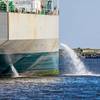Reducing the number of ships that are hijacked by Somali pirates is a realistic prospect in the near‐term if shipowners and operators are willing to adopt a security posture onboard their ships that is directly and robustly proportional to the threat, an industry forum heard on March 24.
Almost 100 delegates, including the former UK Shadow Home Secretary David Davies, were
attending an event hosted jointly by Gray Page and Protection Vessels International. They heard that merchant shipping faced a more widespread threat from Somali pirates than at any time over the past three years*, with a fall in incidents in the Gulf of Aden notably offset by an increase in attacks and hijackings in the Indian Ocean and Arabian Sea, where pirates roam on “mother ships” largely unchallenged by naval forces.
Up to now, shipping industry bodies have been reticent to support the implementation of more
robust security options ‐ such as “armed guarding” ‐ on merchant ships, and most ship‐owners and operators do not currently employ armed guards onboard their vessels when transiting high risk areas. Instead, most rely on other “preventative measures,” such as razor wire, water hoses, warning signs and dummies.
James Wilkes, Managing Director for Gray Page commented: “Understandably, there continues to be a lot of debate about the merits and consequences of employing armed guards on merchant ships and we understand that, in an ideal world, this is not what the industry would want to be doing. However, it is time for shipping to emerge from its comfort zone and face up to the facts and realities of the threat posed by Somali pirates.”
Dom Mee, the founder and Operations Director from Protection Vessels International added: “There is a growing demand from the shipping industry to stem the exponential rise in Piracy. PVI is responding to this by providing an armed escort for vessels transiting through established key
shipping lanes. Indeed there is palpable relief from Masters and Crew to have PVI staff on board
during a transit. We employ high calibre individuals from a British Military background and use
established Rules of Engagement based upon deterrence and self‐defence.”
James Wilkes added: "Our view ‐ informed by real experience and a thorough analysis of the situation in the Gulf of Aden, Arabian Sea and the Indian Ocean over the last three years ‐ has been for some time that the armed guarding of merchant ships in these circumstances is a rational and reasonable response to the threat. We believe that fewer vessels would be attacked and hijacked if they employed professional armed guarding services”.
Dom Mee continued: “Be in no doubt, piracy is extremely expensive, to ship owners, insurers, charterers and the customer. The human cost of losing a crew to hostage for extended periods of time also cannot be underestimated. The use of private maritime security against the average ransom payment of $3‐4m demonstrates a clear cost benefit advantage to the sustainment of international maritime trade.”
“PVI operates in a challenging environment, providing a high quality response to a clear and present threat to global trade. Until a land based solution is implemented to address the causes of Piracy, it will continue to flourish leaving ship owners and operators little choice but to adopt more robust form of deterrence to counter the threat.”
* Attacks and hijacks in the Gulf of Aden and the Indian Ocean rose from sixty‐six [Sept. 2008 – Feb. 2009] to one‐hundred and thirty‐four [Sept. 2010 – Feb. 2011], according to IMO and the Office of Naval Intelligence.










